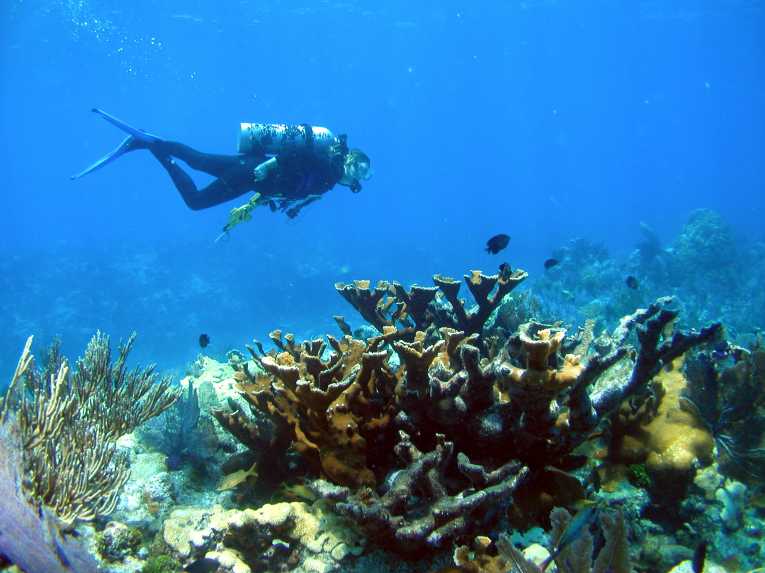Image Caption: Disease-free coral colonies are rare during a white pox disease outbreak, but some colonies (such as those shown here from Molasses Reef) may have natural resistance to this bacterium and may live to recolonize the reef. This cycle of infection and recovery places a premium on maintaining good water quality on the reef so that surviving colonies can regrow quickly. Image Credit: © James W. Porter, University of Georgia
If you were to pick a culprit for the worrying 'coralcide' sweeping the world's reefs, your list of top suspects might be include industrial pollution, the increasingly acidic oceans, or maybe global warming. And they do all appear to share some of the guilt, for crimes against coral. What might not feature too highly, though, is what you flush down the toilet every day. But for the elkhorn coral, which graces the reefs around the Florida Keys, human poop has just been handed down a 'guilty as charged' verdict by scientists from the Rollins College in Florida, and the University of Georgia.
They claim to have proved, beyond all reasonable doubt, that human waste harbors a bacteria which is infecting elkhorn corals - once a common coral of the Caribbean - with white pox disease. That's the bad news. The good news is that Florida is already taking steps o clean up its act, which may help save the corals. The research is published today in the open access journal PLoS ONE.

Image Caption: White pox disease on a frond of the endangered elkhorn coral on Carysfort Reef in the Florida Keys. White pox disease comes from humans, but when it infects coral, as in this case from the Upper Keys, it causes white blotches by killing the overlying coral tissue and revealing the coral's white limestone skeleton underneath. Image Credit: © James W. Porter, University of Georgia
Elkhorn laid low
White pox has been devastating the elkhorn coral, across the Caribbean, for over a decade.
The antler-like branches of elkhorn coral were once one of the most widely-seen species in local reefs.
But the spread of white pox changed that, taking the elkhorn to the brink of extinction.
It is now a protected species under the United States Endangered Species Act of 2006. That has had scientists scrambling around for answers, before the elkhorn coral disappears completely.
Coral scientists have long had their eye on the sewage entering Florida's waters, as a potential trouble-maker for elkhorn coral.
The bacteria responsible for white pox disease, Serratia marcescens, was identified way back in 2002 - and it is commonly found in human feces.
But the bug is not unique to humans.
"When we identified Serratia marcescens as the cause of white pox, we could only speculate that human waste was the source of the pathogen because the bacterium is also found in the waste of other animals," said lead author Kathryn Sutherland, from Rollins college.

Image Caption: The human disease serratiosis is caused by the fecal coliform bacterium Serratia marcescens. When it infects coral, as in this case from Key West, Fl., it destroys the overlying coral tissue, revealing the dead, white limestone skeleton underneath. Image Credit: © James W. Porter, University of Georgia
Human-sourced disease a first?
In order to narrow down the list, the scientists turned to DNA sampling of the strains of S. marcescens found in Key deer, seagulls and Key West wastewater. That showed that only the strain from human poop matched the bacterial strain attacking the coral. The next step was to see if those results could be confirmed by field experiment too. Elkhorn corals were sealed in seawater tanks, and the different strains of bacteria introduced.
Sure enough, those isolated with bacteria from human waste were rapidly laid-low by white pox. "The strain caused disease in elkhorn coral in five days, so we now have definitive evidence that humans are a source of the pathogen that causes this devastating disease of corals," said Sutherland. This is believed to be one of the first instances of humans passing diseases back to the natural world - normally it is the other way around.
But because Florida is in the throes of a state-wide initiative to upgrade its waste-treatment plants, help is at hand. The scientists believe that these measures will go a long way to eliminating the problem, before global warming makes it worse.
Co-author Erin K. Lipp, from the University of Georgia can see trouble ahead, as the planet warms. "We are concerned that disease incidence or severity may increase with rising temperatures," she said, 'reinforcing the importance of protecting near-shore water quality in a changing climate.'
Top Image Credit: Underwater picture of elkhorn coral © werfooters










